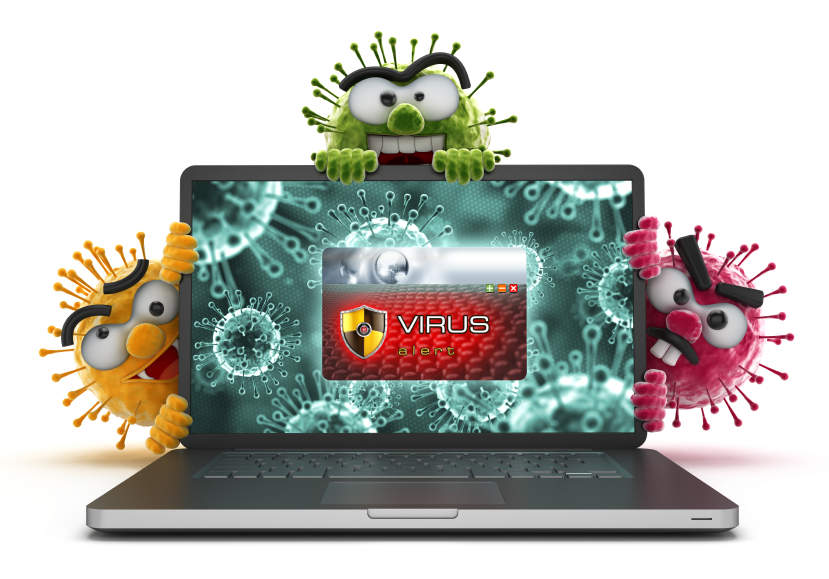What is a Computer Virus?
A computer virus is a malicious code designed to spread from host to host by itself without the user's knowledge to perform malicious actions. It imposes harm to a computer by corrupting system files, destroying data or otherwise by being a nuisance. The reason for designing a computer virus is to attack vulnerable systems to gain admin control and steal confidential information - Cybercriminals prey on online users by tricking them.
How does a Computer Virus Spread
A computer virus spreads through removable media, internet downloads, and e-mail attachments. In other words, a virus spreads while the user is viewing an infected advertisement, visiting an infected website, opening the attachment in the email, or clicking on an executable file. Besides that, connecting with an already infected removable storage device such as a USB drive also spreads the infection.
There are two ways by which a virus operates; the first type starts replicating itself as soon as it lands on the computer; the second type remains dormant until it is triggered. Therefore, it is essential to install robust antivirus software on a computer to steer clear of all such threats.
Computer Virus Symptoms
The list of computer virus symptoms include:
- A slow performing computer
- Pop-ups automatically showing up on the screen
- Programs running on their own
- Automatic multiplying/duplicating files
- Presence of unknown files and applications on the computer
- Files getting deleted or corrupted
Computer Virus Symptoms
Computer Virus Types That You Need Know:
- Boot Sector Virus
- Direct Action Virus
- Resident Virus
- Multipartite Virus
- Polymorphic Virus
- Overwrite Virus
- Spacefiller Virus
- File Infector Virus
Boot Sector Virus

A boot sector virus is a type of virus that infects the boot sector of floppy disks or the Master Boot Record (MBR) of hard disks (some infect the boot sector of the hard disk instead of the MBR). The infected code runs when the system is booted from an infected disk, but once loaded it will infect other floppy disks when accessed in the infected computer. While boot sector viruses infect at a BIOS level, they use DOS commands to spread to other floppy disks. For this reason, they started to fade from the scene after the appearance of Windows 95 (which made little use of DOS instructions). Today, there are programs known as 'bootkits' that write their code to the MBR as a means of loading early in the boot process and then concealing the actions of malware running under Windows. However, they are not designed to infect removable media.
The only absolute criteria for a boot sector is that it must contain 0x55 and 0xAA as its last two bytes. If this signature is not present or is corrupted, the computer may display an error message and refuse to boot. Problems with the sector may be due to physical drive corruption or the presence of a boot sector virus.
Boot Sector Virus

A boot sector virus is a type of virus that infects the boot sector of floppy disks or the Master Boot Record (MBR) of hard disks (some infect the boot sector of the hard disk instead of the MBR). The infected code runs when the system is booted from an infected disk, but once loaded it will infect other floppy disks when accessed in the infected computer. While boot sector viruses infect at a BIOS level, they use DOS commands to spread to other floppy disks. For this reason, they started to fade from the scene after the appearance of Windows 95 (which made little use of DOS instructions). Today, there are programs known as 'bootkits' that write their code to the MBR as a means of loading early in the boot process and then concealing the actions of malware running under Windows. However, they are not designed to infect removable media.
The only absolute criteria for a boot sector is that it must contain 0x55 and 0xAA as its last two bytes. If this signature is not present or is corrupted, the computer may display an error message and refuse to boot. Problems with the sector may be due to physical drive corruption or the presence of a boot sector virus.
Resident Virus

A boot sector virus is a type of virus that infects the boot sector of floppy disks or the Master Boot Record (MBR) of hard disks (some infect the boot sector of the hard disk instead of the MBR). The infected code runs when the system is booted from an infected disk, but once loaded it will infect other floppy disks when accessed in the infected computer. While boot sector viruses infect at a BIOS level, they use DOS commands to spread to other floppy disks. For this reason, they started to fade from the scene after the appearance of Windows 95 (which made little use of DOS instructions). Today, there are programs known as 'bootkits' that write their code to the MBR as a means of loading early in the boot process and then concealing the actions of malware running under Windows. However, they are not designed to infect removable media.
The only absolute criteria for a boot sector is that it must contain 0x55 and 0xAA as its last two bytes. If this signature is not present or is corrupted, the computer may display an error message and refuse to boot. Problems with the sector may be due to physical drive corruption or the presence of a boot sector virus.
Types of Spyware
Spyware is not just one type of program. It's an entire category of malicious software that includes adware, keyboard loggers, Trojans and mobile information stealing programs.
Adware
Malicious adware is often bundled in with free software, shareware programs and utilities downloaded from the internet or surreptitiously installed onto a user's device when the user visits an infected website. Many internet users were first introduced to spyware in 1999 when a popular freeware game called Elf Bowling came bundled with tracking software. Adware is often flagged by antimalware programs as whether the program in question is malicious or not.
Keyboard loggers
Keyloggers are a type of system monitor that are often used by cybercriminals to steal Personal, Finantial and business Information, login credentials and sensitive enterprise data. Keyloggers may also be used by employers to observe employees' computer activities; parents to supervise their children's internet usage; device owners to track possible unauthorized activity on their devices; or law enforcement agencies to analyze incidents involving computer use.
Trojan
Trojans are typically malicious software programs that are disguised as legitimate programs. A victim of a Trojan could unknowingly install a file posing as an official program, allowing the Trojan to have access to the computer. The Trojan can then delete files, encrypt files for ransom or allow others to have access to the user's information.








